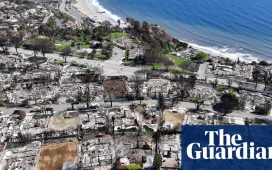
Urgent action is needed to create “climate-ready” homes, according to a major insurer.
Aviva said properties should be retrofitted and built resiliently to withstand extreme weather.
The company said it wants to see strengthened planning policies to avoid development in high-risk areas and requirements to embed resilience measures where developments are granted.
If the UK is to become a leader in hitting net zero targets, then it needs to act on the sources of carbon emissions, including less widely recognised sources like the carbon cost of flooding
Adam Winslow, Aviva
Aviva is calling for basic cost-effective climate resilience measures to be made mandatory in all new-build properties, not just those in high-risk areas.
The insurer said the carbon cost of restoring a flood-damaged property can be significantly reduced when measures are in place such as flood doors, sealed brickwork and raised electrical points.
Carbon emissions may be saved when flood resilience measures are in place through having to do less building restoration as well as fewer contents needing to be replaced.
In addition, a property without resilience measures installed could lead to owners having to move out of their home for a considerable period.
We need to lay the groundwork now for homes that are built, repaired and strengthened for UK weather patterns that are inevitably going to be more extreme
Adam Winslow, Aviva
Failing to protect a house from flooding can have a significant carbon footprint – equivalent to six-and-a-half return transatlantic flights – analysis by Aviva suggests.
The insurer said the carbon impact is the “unseen” cost of a flooded property, in addition to the financial and emotional distress.
In a report produced by the insurer, Adam Winslow, chief executive officer of Aviva UK and Ireland General Insurance, said: “Adapting to extreme weather and reducing emissions are two sides of the same coin, to be tackled together – or we risk creating a vicious cycle.
“If the UK is to become a leader in hitting net zero targets, then it needs to act on the sources of carbon emissions, including less widely recognised sources like the carbon cost of flooding.
Urgent measures are needed to future-proof our homes from the extreme weather events that are increasingly battering Britain
Mike Childs, Friends of the Earth
“We need to lay the groundwork now for homes that are built, repaired and strengthened for UK weather patterns that are inevitably going to be more extreme.
“From the point of design, planning, construction and repair, we need to consider every aspect of our built environment.”
Friends of the Earth’s head of policy Mike Childs said: “Urgent measures are needed to future-proof our homes from the extreme weather events that are increasingly battering Britain.
“As well as improved flood protection, we need much better insulation too, especially for existing homes, with priority given to those most in need. This will not only help keep people warm in winter and cool when it’s hot, it will also slash energy bills too.
“Ministers must also take tougher action to tackle the cause of the climate crisis by ditching new fossil fuel developments, accelerating the move to net zero and focusing on green power and energy efficiency.”
A Government spokesperson said: “We recognise the personal devastation that flooding can cause and how climate change means we must take further action against this danger. Our record level of investment has better protected over 300,000 homes since 2015.
“Alongside this, we are working with industry to support access to affordable insurance, which will enable homeowners to return home quicker after flood events, and are helping flooded households become more resilient to flooding.
“The impact of climate change must already be considered when approving developments – and we’re consulting on our reforms to national planning policy to see how this can further support climate change adaptation.”











